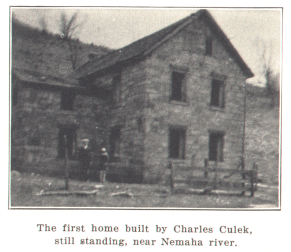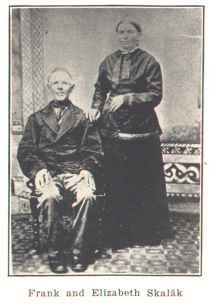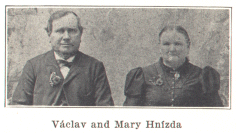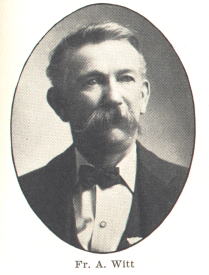 |
Richardson County -- 1865 |
This is a NEGenWeb Project web page
and is presented as part of the
MARDOS Memorial Library Collection.
Richardson County -- 1865
|
As noted elsewhere, Charles Zulek (or Culek, as he originally spelled it) was the first Czech to enter Richardson County. His oldest daughter Anna (Mrs. Baur), who was six years old at the time, writes: "We came to Nebraska from Illinois in June, 1856. The trip was made with oxen and took six weeks' time. We had intended to go to Topeka, but learned that there was warfare there, so decided to settle in Nebraska. Father took a claim two miles east of what is now Humboldt. Someone jumped this claim and involved him in a lawsuit, which he (father) won. When the Homestead Law went into effect, father took a homestead about five and a half miles south of what is now Humboldt. In the fall of 1867 he built the stone house which still stands on the site of the old homestead and is here illustrated. The early settlers and homesteaders built their first houses of logs. There was plenty of timber along the rivers. Soon afterwards they began constructing permanent houses of stone, of which there was an abundance in the hills. Father came to Nebraska without any money. He borrowed one hundred dollars in Missouri and paid twenty percent interest on it. In those days a quarter section of land cost $200.00, but the price soon rose to $300.00. The first sawmill was erected in Salem in 1856. Methodists first settled here in 1856. Deer, elk, antelope, buffalo and wolves were numerous. Our dog caught a deer in the river and father helped him kill it. This was at Christmas time, so we had venison for our first Christmas Eve in Nebraska. Our bread was made of corn mixed with water. Our first school was situated about three miles south of Bern, Kansas. Father loaded my brother Joseph and me in a wagon and also our bed, bed-clothes, provisions and clothing. The teacher and pupils lodged in the same room. We stayed there for the term and then moved our bed and bedding back home again, repeating the operation during each term. It was called a "subscription school", because each neighbor subscribed the amount necessary to pay the teacher. Later a school was built three miles from our home, where we walked daily and back again, and still later we had a schoolhouse half a mile away. I remember the first baptism. Mr. Nims opened his first store on the banks of the Long Branch. The baptism was held in front of the store, in the river. A hole was cut in the ice, it being freezing weather. The people were then baptized in the water and they had to walk to town in the cold. The woman who was baptized first was never well afterward."  Joseph Zulek, Mrs. Bauer's brother, writes: "My father settled in Richardson County in August 1856 and the following November I was born. Brownville was our nearest settlement, thirty miles distant. Father had a yoke of oxen, which meant slow and arduous traveling, especially in rainy weather. In fact at such times and for some time afterward it was impossible to ford the streams. We had a good spring, but when the river rose, father had to get drinking water from a distant spring back in the hills. I remember his telling of the time when he was fording the river with a load of sheep. The oxen would not go the way they were meant to, but over-turned the wagon and the sheep all went into the river. When their fleece became thoroughly soaked, they were very heavy for father to lift back into the wagon. There was a little corn mill on the Nemaha river, but it worked only when there was enough water. Sometimes we could not get our corn ground for weeks and had to subsist on potatoes in the meantime." The little town of Arago, on the Missouri river, was the first stopping place for Czechs in Nebraska. That was before the railroad was built through and they came via Chicago to St. Joseph and up the Missouri River, as many as four boats being at the landing at one time. Of course the homestead law had attracted attention of settlers and so we find that in 1864 and 1865 a number of Czechs composed a transient population there, and in 1864 John Herman and Robert J. Shary with families had settled there and conducted a distillery and tavern. Vaclav Sestak, a relative of Mr. Herman, was there with them. All of these soon removed to Saline County, in the history of which mention is made of them. About that time the following also were there: Joseph Jindra and family, Matej Prachejl, John M. Svoboda and wife, Mrs. Kubicek (a widow) and her two sons Matej (Matthew) and Frank Kubicek. She was also the mother of John M. Svoboda and they all lived together, Svoboda and his wife being cigar makers. In 1863 Svoboda had made a trip to Colorado, accompanying a soldiers' train. All of these people shortly removed to the vicinity of Crete, Saline County. Frank Fidrmutz settled in Richardson permanently, near Humboldt. Within a short time Mr. Shary moved to Aspinwall, a nearby village, now vanished. Mr. Herman worked in the mill in Arago, later following Mr. Shary to Aspinwall, at which time the following Czechs lived in that village: The families of Herman and Shary, Vaclav Kostohryz and Frank Dusil (all moved to Saline) and a Jew named Rother. Thus the first Czechs came here in 1864, but the first to locate permanently did so in 1865, in the vicinity of Humboldt, where Charles Zulek, who aided and advised them, was already living. 1865--The Following Came: 
Frank Skalak, born in Sokolec; John Vokoun, born in Libice; Vaclav Brzon, born in County of Caslav; M. Nemecek, birthplace unknown. 1866--The Following Came: Frank Fidrmutz, born in Kraluv Mestec; John Petrasek, born in Libice; Vaclav Prachejl, born in Vosecek; Vaclav Holecek, born in Libice; John Janata, birthplace unknown; Frank Nemecek, born in Kraluv Mestec. 1867--The Following Came: Vaclav Hnizda, born in Trhova Zahradka; Ferdinand Blecha, born In Hlinec; Vaclav Hlavaty, birthplace unknown; John Musil, birthplace unknown. 1868--The Following Came: Anton Eis, born in Slavikov. 1869--The Following Came: John Cizner, birthplace unknown. The pioneers of this county had to meet the current problems. Mrs. Sophie Eis, wife of John Eis, daughter-in-law of Anton Eis, and niece of Chas. Zulek, writes: "When my husband came to this country, the journey over the ocean lasted thirty-three days, for the ship became disabled. He came to my uncle Charles Zulek, who had settled here in 1856 and had been obliged at first to walk to St. Joseph, Mo. for provisions, seventy-five miles each way. Uncle Zulek used to wrap sacks around his feet, take a loaf of bread and set out to St. Joseph, for provisions, or to work. People settled near timber and water, even if such lands were not as good as others. When my husband arrived, all the homesteads were gone, but there were no fences and stock grazed freely. The first settlers had no means with which to build fences and their gardens and fields were often wrecked by the cattle. My husband says that during the first two years he never saw a piece of money, farmers paid each other with work. When they took products to town, they had to trade them out. Meat sold for 8 cents a pound, eggs 5 cents a dozen, poultry 4 cents live weight. But all were happy and did more for each other than people do now." 
Frank J. Hnizda, son of an early pioneer Vaclav Hnizda, writes: "My parents came to Nebraska from Chicago in 1867, stopping first in Aspinwall. They registered for a homestead in Johnson County, at Brownville, but that land was poor and badly cut up by ditches, so they gave it up and returned to Brownville, staying there about two months. Then they rented 40 acres two miles west of Aspinwall. They had the land plowed and then put in corn, cultivating it by hand. In the fall, when the corn was beginning to ripen, grasshoppers came in thick clouds and the garden was destroyed by evening of the first day. The pests then attacked the corn, annihilating the leaves and stalks, leaving the ripening ears bare on the ground. In 1868 my parents purchased 160 acres just across the line in Pawnee County, for $1,000.00. They farmed this land for eight years, the last two of which were again "grasshopper years". Fodder and hay were high so father decided to sell off the livestock and all the rest and move to Humboldt. Being a shoemaker by trade, he engaged in that business there for a good many years. During those early times corn sold as low as 8 cents per bushel. Missouri River towns were their trading points. Mail was delivered to town by a carrier on horseback. My father told of Mr. Zulek taking a lot of hams and bacon to Nebraska City. He was offered 2 cents a pound in cash or 2 1/2 cents in trade, so he hauled his load to Omaha. There he was offered 2 1/2 cents in cash or 2 3/4 cents in trade. So he turned around and hauled it to St. Joseph, Mo., where he sold it for 2 3/4 cents in cash. My father and his sons Frank J. and James erected several business buildings in Humboldt. He lived to a ripe old age, as did my mother." As in all Czech communities, there are good musicians in Humboldt also. Alois Watzek (Vacek), born in Piskova Lhota, Podebrady Bohemia, has directed the local band for almost forty-five years and during that time has instructed bands in the vicinity. He was for six years a member of a military band in the Austrian army and conducted a military band in Russia for four years after the Turkish War. During the World War he was leader of the band at the National Soldiers' Home in Forth Leavenworth, Kansas. He is a cornetist of note and recognized as an instructor. 
Among those who were active in national and lodge life, Frank A. Witt was one of the most prominent. He officiated at many funeral services for Liberals, as non-sectarian speaker. Mr. Witt was born in Volin, near Klatovy, Bohemia, June 12, 1839. In 1866 he married Miss Anna Bouril and soon thereafter emigrated to this country, settling first in Dayton, Ohio, later in Chicago, Ill., and still later in Crete, Nebraska. In 1874 he bought railroad land there, but the grasshoppers drove him out. In 1877 he lived for a time in Calvert, Texas, but returned to Nebraska and settled in Humboldt. There he lived with his wife until 1916, when they made their home with their sons Bohumil F. and Jaroslav L., in Newman Grove, Nebraska, where they both died. Mr. Witt's demise occurred on May 18, 1925. Czechs in this county live in and around Humboldt, being a part of the colony that extends over into eastern Pawnee County. |
| Back | Table of Contents | Next |